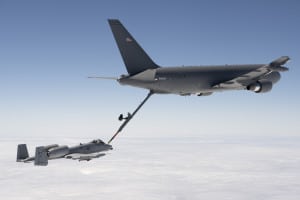
Boeing [BA] said Thursday it will take another after-tax charge on the KC-46 aerial refueling tanker program, this one costing $393 million.The company said the charge, its fourth, reflects higher costs associated with previously announced program schedule and technical challenges. These include implementation of the hardware solution to resolve the refueling boom axial load issue identified during flight testing, delays in the certification process and concurrency between late-stage development testing and initial production.Boeing has taken after-tax charges in April 2015…













